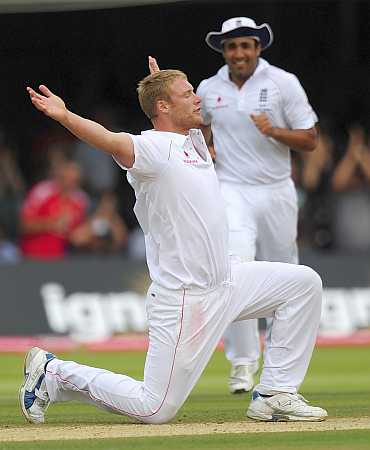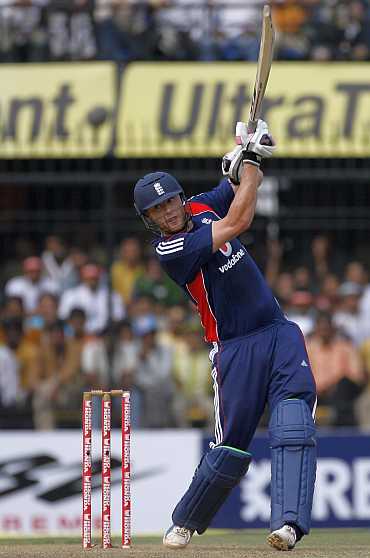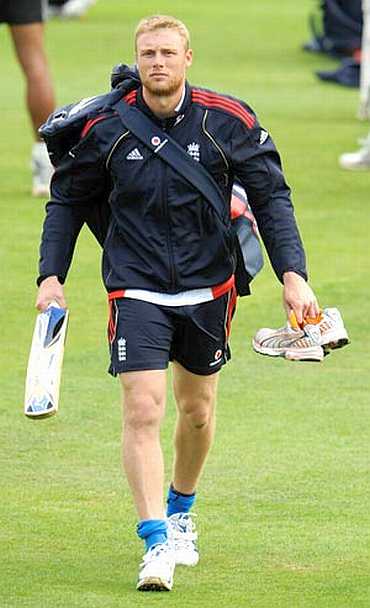 | « Back to article | Print this article |
Finest display by an England all-rounder since Botham
Over the course of two glorious summers Andrew Flintoff bowled with pace and fury, hit the ball with power and precision and caught everything in sight in the slips.
To England's enduring delight, the second season coincided with the 2005 Ashes challenge and an epic series nominated by the annual Wisden almanac as the best in Test history.
Flintoff, who retired from all cricket on Thursday at the age of 32 after conceding his battered body had endured enough, towered above his team-mates. He scored 402 runs and captured 24 wickets in the finest display by an England all-rounder since Ian Botham performed miracles in the 1981 Ashes series.
England had assembled an excellent team at the midpoint of the decade under the cool, cerebral leadership of Michael Vaughan to combat the all-conquering Australians.
But they would not have won the Ashes for the first time in 18 years without Flintoff, who was named man-of-the-series ahead of Shane Warne.
A genuinely hostile fast bowler
The athletic, blonde giant who tore into the Australian batting and bowling was a far cry from the chubby youngster who made his Test debut against South Africa in 1998.
Flintoff had talent but little application. He seemed incapable of building an innings, his bowling was ordinary and his ballooning weight reflected a passion for beer and curries.
Former Australian captain Bobby Simpson, then in charge of Flintoff's county, Lancashire, told him bluntly he was wasting his ability. His agent passed on a similar message.
In response, Flintoff buckled down to the demanding training regimes of the modern sportsman.
His batting, always essentially orthodox, blossomed and in 2003 he scored a century and three half-centuries in a home series against a good South African side. He re-modelled his bowling and with his natural strength and height developed into a genuinely hostile fast bowler.
A world-class all-rounder
Flintoff's emergence as a world-class all-rounder coincided with Vaughan's ascent to the England captaincy and that frustratingly brief period when Steve Harmison's mind and body combined in sufficient harmony to make him the world's most dangerous opening bowler.
England won seven Tests in a row against New Zealand and West Indies in 2004 with Flintoff scoring a half-century in each of the victories.
Already, though, it was clear the unnatural demands of fast bowling were taking a toll on his joints. He needed an operation on his fragile left ankle but recovered in time for the first Test against Ricky Ponting's Australians, a side containing some of the great names in the modern game in Warne, Glenn McGrath, Adam Gilchrist and Mathew Hayden.
Flintoff ripped through Australian batting line-up during Ashes
In a ferocious opening hour at Lord's, Harmison and Flintoff badly rattled the powerful Australia batting, but dropped catches and a mesmeric spell from McGrath resulted in yet another defeat. Flintoff made nought and three and England's Ashes dream seemed over before it had properly begun.
Somewhere between Lord's and Edgbaston, England and Flintoff rediscovered their winning formula.
Flintoff hit nine sixes in the second Test in a total of 141 runs and took seven wickets. England won by two runs and, in a gesture, which confirmed Flintoff's new status as England folk hero, his first instinct was to console Australian batsman Brett Lee.
He scored a measured, mature century at Trent Bridge and took five wickets in a spell of sustained pace bowling at the Oval which kick-started England's fightback for the draw they needed to win the series.
Honours and awards and a memorable drinking session after the final Test were followed by the England captaincy when Vaughan was injured. Flintoff led from the front to draw a series in India and was again man-of-the-series for his all-round contribution.
Flintoff's sudden decline startling
Flintoff's sudden decline after the 2006 India tour was startling. He missed most of the season after injuring his ankle in a foolishly prolonged bowling spell against Sri Lanka then led England to a 5-0 defeat in Australia where he was reprimanded by the team management for excessive drinking.
After Vaughan returned as captain, another drunken escapade at the 2007 World Cup in the Caribbean cost Flintoff the England vice-captaincy and the injuries began to multiply.
There was, though, still one last campaign left for an increasingly battered warrior.
Flintoff announced his retirement from Test cricket before the second Ashes Test at Lord's last year and then bowled England to victory.
A direct hit on the stumps to run out Ponting in the final Test at the Oval turned the game in England's favour and Flintoff's final match for his country resulted fittingly in another Ashes triumph.
Flintoff's overall Test batting average of 31.77 and 226 wickets at 32.78 are those of a good, rather than a great player. But in 2005, when it mattered most for himself and his country, he stood comparison with Botham, Imran Khan and Keith Miller among the great fast-bowling all-rounders.

© Copyright 2025 Reuters Limited. All rights reserved. Republication or redistribution of Reuters content, including by framing or similar means, is expressly prohibited without the prior written consent of Reuters. Reuters shall not be liable for any errors or delays in the content, or for any actions taken in reliance thereon.




